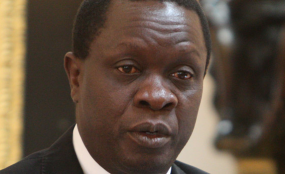By By Alex Malanga
The government has unveiled measures aimed at preventing the total collapse of privatised factories.
A 19-day ultimatum was issued yesterday to investors running non-performing privatised firms to kick-start production or risk losing the factories.
Other measures announced by Industry, Trade and Investment minister Charles Mwijage include controlling sub-standard and counterfeit products and curbing under-valuation and under-declaration of goods.
The two measures are expected to enhance fair competition in the market.
Mr Mwijage said a team comprising officials from his ministry and the Home Affairs and Finance and Planning ministries had been formed to ensure the initiative was implemented as planned.
The government admitted making mistakes in the past, noting, however, that everything was now under control and that Tanzania was on track as far as the industrialisation goal was concerned.
Some of the mistakes made in the past include failure to make follow-ups on privatised companies and protect local industries from unfair business practices.
An assistant director for investment and research in the Ministry of Industry, Trade and Investment, Ms Elli Pallangyo, said out of 156 industries which were privatised between 1992 and 2004, a total of 54 were inoperative.
Mr Mwijage said the government would repossess all idle privatised factories after next month’s deadline expires.
“We will have to repossess former state-owned industries sold to private investors who have failed to run them after August 15, this year,” he told reporters.
“The government sold these factories to private investors on the understanding that they develop them. We won’t tolerate those who would not have abided by what we agreed.”
Mr Mwijage said dormant factories would be repossessed and handed over to serious investors, adding that leaving them idle would be contrary to the government’s industrialisation agenda.
Since the Fifth Phase government took over in November 2015, industries valued at Sh5.2 trillion had been set up.
A total of 224 manufacturing projects valued at $822.2 million were registered by the Tanzania Investment Centre (TIC) from November 2015 to March 2017. The investments created 19,935 jobs.
A total of 128 projects worth $1436.9 million and employing 13,120 people were registered by the Business Registration and Licensing Agency (Brela) .
Forty-one projects were registered under the External Processing Zone Authority (EPZA).
Mr Mwijage said three teams had been formed to make follow-ups on privatised industries, with the first one consisting of experts and regional commissioners.
The second team comprises experts, regional commissioners and permanent secretaries from his ministry and the Home Affairs and Finance and Planning dockets.
The third team comprises experts, ministers and permanent secretaries from the three ministries.
Regional commissioners, Mr Mwijage said, would visit all privatised factories to establish whether they were operating or not.
“Feedback will then be forwarded to me for action after the August 15 deadline,” he said.
Mr Mwijage urged those who had failed to run privatised factories to hand them back voluntarily instead of waiting for the government to forcibly repossess them.
“We harbour no malice. We only want to ensure that all dormant factories resume production.”
The government, Mr Mwijage said, was committed to generating more foreign currency and jobs for the youth through industries, adding that 65 per cent of Tanzanian youth aged up to 35 were unemployed.
In November 2015, the government summoned investors who had bought public farms and factories in a new move to review failed privatisation.
The government said in a statement that some of the investors had not developed the privatised firms as agreed, lacked investment plans or changed them without permission.
President John Magufuli yesterday said investors who had bought former state-owned manufacturing firms should surrender them to the government if they were unable to run them profitably.
“I repeat my call to those who have failed to run privatised factories, including the CCM MP here in Morogoro, to return them to the government,” Dr Magufuli said in Morogoro as he was returning to Dar es Salaam from a tour of Kagera, Kigoma, Tabora and Singida regions.
“It is time we handed the factories over to those who can run them effectively and employ our people,” he said.

